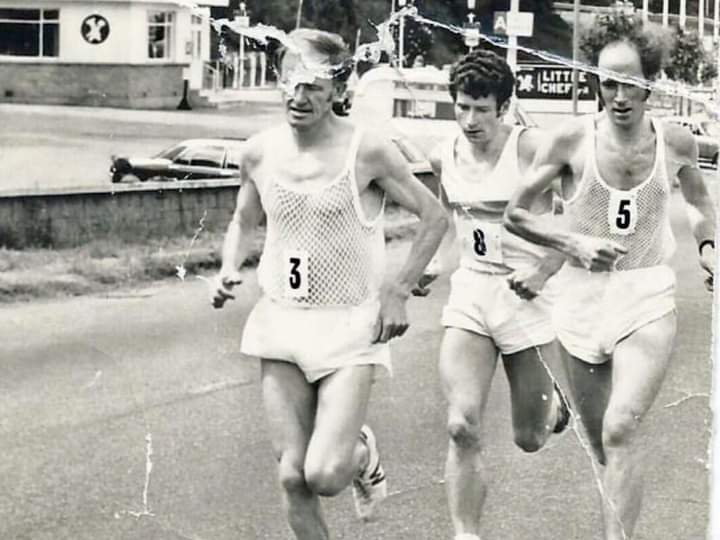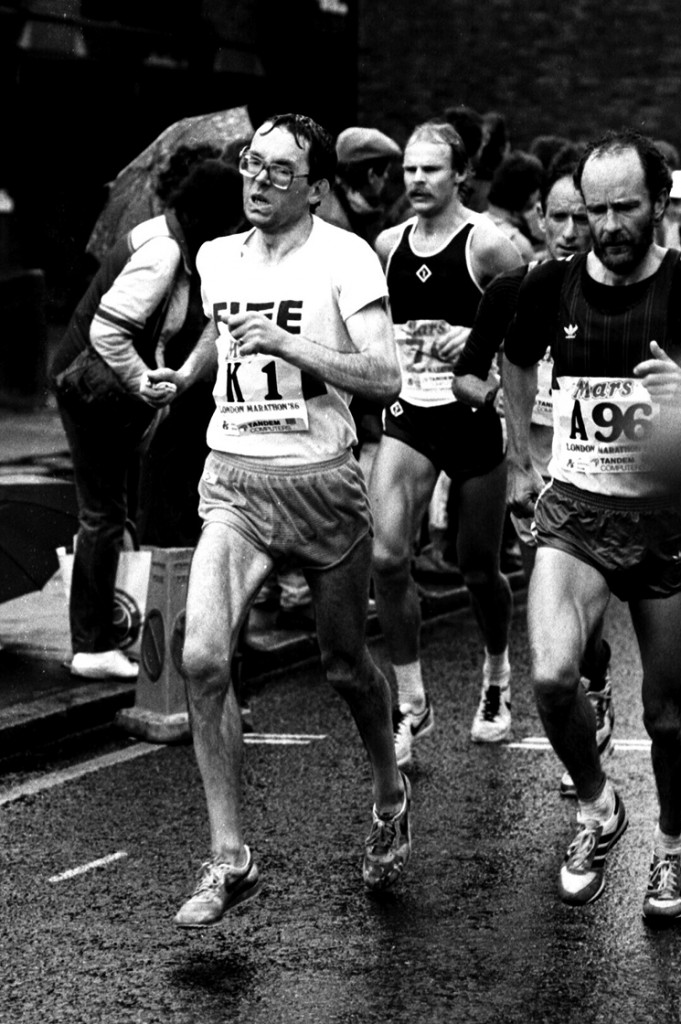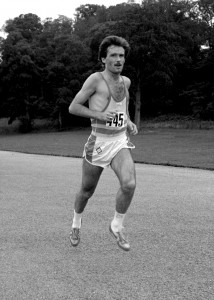
Graham Laing: men’s winner in the first race
The seventies and eighties were wonderful decades for Scottish marathon runners – wherever you lived in the country, there was sure to be a marathon near you! And the SAAA Championship was a dedicated race held in the Scottish Championships. The Aberdeen Marathon was one of the best of these and Colin Youngson has written the following portrait of the race.
Despite the efforts of the incorrigible Alastair Wood and his staunch training partner Steve Taylor, who inspired many Aberdeen AAC runners to do well in the Scottish Marathon Championship, the Shettleston Marathon and other marathons in England, Europe and beyond, there was no post-war local full-distance marathon event, although there were plenty of long training races (from 10 miles to 21 miles) in the North, East or West of Scotland. And in fact every Sunday run with Wood and co was a race!
Fraser Clyne has written: “Marathon running didn’t return to Aberdeen until 1979 when Mel Edwards of Aberdeen AAC organised a race over a four-lap course at the Bridge of Don on the northern outskirts of the city, with the start and finish on the university running track at Balgownie. Graham Laing, making his marathon debut, won ….The race attracted a field of 62 runners (the biggest marathon held in Scotland) but this increased to a peak of 1,314 by 1984. Numbers declined from then on and when the race was last held in 1990, there were just 174 finishers.”
Aberdeen Marathon Winners
1979 16th September: Norco Aberdeen Marathon
1 Graham Laing (Aberdeen AAC) 2.21.40
2 Jim Brown (Clyde Valley AAC) 2.22.22
3 Colin Youngson (Edinburgh Southern H) 2.27.44
4 John Bigham (RAF Cosford) 2.28.00.
5 Willie Day (Falkirk Victoria H) 2.29.33
6 Doug Gunstone (EAC) 2.29.57
7 Evan Cameron (ESH) 2.31.22
8 John Lamont (AAAC) 2.34.46
9 Colin Martin (AAAC) 2.34.58
10 Alastair Wood (Cambuslang H) 2.35.47 1st Vet
59th equal James Youngson (aged 66) 4.05.39
1st Team: AAAC; 2nd ESH.
1st Woman: Leslie Watson (London Olympiades) 3.01.06
2nd Elin Abom (Sweden) 3.55.08.
Leslie, of course, was the London physiotherapist, originally from Glasgow, who became an iconic figure in British marathon running, completing an amazing 206 marathons. She was Scottish marathon record holder and in 1981 set a world record for fifty miles in Connecticut, USA. Google Leslie Watson for more impressive achievements.
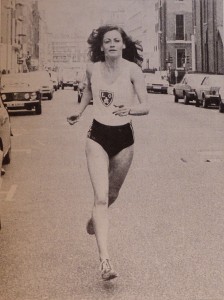
The route involved three and a half laps of the track and then out onto Balgownie Road then right for four gruelling left-hand-circle laps past Causewayend, Lower Bonnyside and Whitestripes Road, before going back down Balgownie Road and finishing with one lap of the track. 107 entered, including 8 women. 77 started and 60 finished. Jim Brown, a tremendously successful Scottish and UK international cross-country and track runner, started fast, with Willie Day and Ian Elliot (ESH) for company. However by ten miles (54.06) Graham Laing had caught up. They ran together until 20 miles (1.47.45) before 20 year-old Graham moved away to victory. My diary states: “Windswept, undulating, tiring course. Kept going slowly but quite strongly. During last lap, I came past Doug Gunstone and Willie Day (and the RAF runner John Bigham, who was sent off course). Reasonably okay effort.”
1980 28th September: City of Aberdeen Milk Marathon
1 Graham Laing (Scotland) 2.19.33
2 Don Faircloth (England) 2.21.46
3 Mike Critchley (England) 2.23.18
4 John Robertshaw (Wales) 2.24.16
5 Paul Eales (England) 2.24.44
6 Mick McGeoch (Wales) 2.25.36
7 Don Macgregor (Scotland) 2.26.48 1st Vet
8 Dic Evans (Wales) 2.28.03
9 Evan Cameron (Scotland) 2.30.13
10 Jim Dingwall (Falkirk Victoria H) 2.30.40
11 Marty Deane (Northern Ireland) 2.30.55
12 Graham Milne (AAAC) 2.33.13
James Youngson (aged 67) 3.36.18
1 England; 2 Scotland; 3 Wales; 4 N. Ireland.
1st Woman: Margaret Chambers (Blaydon) 3.05.07
2nd Nancy McCraw (Teviotdale) 3.36.29
3rd Kim Boxell (Fife) 4.06.43
A brilliant run by the youthful newly-crowned Scottish Marathon Champion, Graham Laing, who outclassed the experienced 1970 Commonwealth Marathon bronze medallist Don Faircloth. Graham’s time, on the same exhausting course as before, was an excellent one. The P and J reported: “Early on, Laing forged ahead of Bolton’s Mike Critchley the leading Englishman, and after ten miles had a 45 second advantage, which had become 2 minutes 18 seconds by 20 miles. He broke his own course record and reduced his personal best by 2 minutes 7 seconds. A well-judged race was run by Don Faircloth of Croydon, who moved from 6th in the second lap to second at the finish.” Recently crowned World Veteran Marathon Champion Don Macgregor was a long way in front of his M40 challengers.
1981 27th September: City of Aberdeen Milk Marathon
1 Max Coleby (England) 2.21.29
2 Martin Knapp (England) 2.21.30
3 Don Macgregor (Scotland) 2.21.52 1st Vet
4 Fraser Clyne (Scotland) 2.23.36
5 Dic Evans (Wales) 2.24.24
6 Mick McGeoch (Wales) 2.24.41
7 Evan Cameron (Scotland) 2.26.23
8 Tim Hassell (England) 2.26.57
9 Graham Milne (Scotland) 2.27.13
10 Doug Gunstone (Springburn H) 2.27.26
11 Peter Wilson (AAAC) 2.27.34
201st James Youngson (aged 68) 3.31.16
1st England; 2nd Scotland; 3rd Wales.
1st Woman: Katie Fitzgibbon (London Olympiades) 3.07.46
2nd Priscilla Welch (Shetland) 3.08.55
3rd Lynda Stott (AAAC) 3.21.12
Priscilla went on to become one of the greatest veteran marathon runners. Her peak performances included: sixth in the 1984 Los Angeles Olympics; and at the age of 42, second in the London Marathon (2.26.51) and first in the New York Marathon.
This race took place in cold gale-force winds and driving rain. The new course finished in one of Aberdeen’s lovely grassy areas: Duthie Park. Before that, starting opposite the Beach Ballroom, it looped round Union Street, Riverside Drive and the harbour, then up the Esplanade and back down King Street, Riverside Drive, Holburn Street, Great Western Road, North Deeside Road, Maryculter Bridge, and the South Deeside Road. Fraser Clyne was making his marathon debut and ‘went for it’ at 17 miles. Unfortunately, having pulled away, he ‘hit the wall’ and struggled home fourth. Max Coleby, an experienced GB international runner from the famous Gateshead Harriers, squeezed home after an exciting sprint against his team-mate Martin Knapp.
1982 19th September: City of Aberdeen Milk Marathon
1 Gerry Helme (England) 2.15.16
2 Ieuan Ellis (Wales) 2.16.47
3 Fraser Clyne (Scotland) 2.19.58
4 Colin Youngson (Scotland) 2.21.03
5 Nigel Spiers (Wales) 2.22.36
6 Mick McGeoch (Wales) 2.23.14
7 Donald Ritchie (AAAC) 2.24.00
8 Jim Ashworth (England) 2.25.54
9 Sam Graves (Fife AC) 2.26.11
10 Peter Wilson (Scotland) 2.26.20
1st Vet Jim Ash (Beith H) 2.31.49
1 Wales; 2 Scotland; 3 England; 4 Northern Ireland.
1st Woman: Jacqui Hulbert (Wales) 2.52.20
2nd Lynda Stott (AAAC) 2.53.04
3rd Priscilla Welch (Shetland) 2.55.59
This race must have been a real tussle!
The route started on the Beach Boulevard, and then went down Union Street, Riverside Drive, past the harbour, up the Esplanade, King Street, Market Street, the harbour again, Riverside Drive, Holburn Street, Great Western Road, North Deeside Road, Maryculter Bridge, South Deeside Road, Riverside Drive, the harbour and finished next to the Beach Boulevard.
My diary notes: “Cool day. Not much wind. Facing wrong way when Provost fired gun prematurely! Shot off up hill into Union Street, then in behind Fraser. Broke away from Gerry and Ieuan (rest well dropped). 5 miles in 25.03! Caught by Gerry then dropped him on the cobbles. 10m 50.47 – too fast. Hung on up Holburn and out Great Western Road past Grampian TV but had to let go at the hour, in Mannofield. Kept going steadily, though passed by Gerry. Ieuan flew past at 18 miles – slight headwind. Plodded on for the last eight miles – very tired but trying hard and held off the pursuers by one and a half minutes. Fraser blew up last two miles, but didn’t see him until last half mile. A good try. Not very smart tactics, though.”
Gerry Helme, from St Helens on Merseyside (who went on to run a wonderful 2.10.12 in the 1983 London Marathon) had recorded the fastest-ever time on the fastest course for the Aberdeen Marathon. Ieuan Ellis was seventh (2.15.12) in the 1986 Edinburgh Commonwealth Games and recorded a personal best (2.13.21) in that year’s Beijing Marathon. Fraser Clyne lost three minutes to Ellis in the last three miles. However he soon became one of Scotland’s best-ever marathon runners, with a 1985 PB of 2.11.50 when he was second in the US Marathon Championships in Sacramento. Jim Ash – an extremely durable athlete – for several years lived in Peterhead and worked as a fire and safety officer with Shell Expro at St Fergus gas terminal before being transferred to Fife.
1983 18th September: City of Aberdeen Milk Marathon
1 Kevin Johnson (England) 2.19.01
2 Trevor Hawes (Wales) 2.19.41
3 Calum Bark (England) 2.19.57
4 Marty Deane (Northern Ireland) 2.20.08
5 Dave Hill (England) 2.21.27
6 Peter Wilson (Scotland) 2.21.53
7 Mick McGeoch (Wales) 2.24.18
8 Charlie Haskett (Dundee Hawkhill H) 2.24.57
9 Don Ritchie (Scotland) 2.25.20
10 Ian Moncur (Forres H) 2.27.47
11 Craig Ross (AAAC) 2.28.42
12 Billy Brannigan (Northern Ireland) 2.30.40 1st M40
13 Alastair Wood (AAAC) 2.31.48 1st M50!
14 G. Williamson (N.I.) 2.32.16
15 Jim Ash (Beith H) 2.32.55
16 Sam Graves (Fife AC) 2.33.00
17 Murray McNaught (Fife AC) 2.34.46
18 Steve Brown (Wales) 2.36.04
1 England; 2 Wales; 3 Northern Ireland.
1600 started.
1st Woman: Lynda Bain (AAAC) 2.50.29
2nd Jacqui Hulbert (Wales) 2.56.20
3rd Morag Taggart (AAAC) 3.07.08
Marriage obviously suited the former Lynda Stott’s rapidly improving marathon form. The quietly –spoken librarian, who only started running in 1981, had fitted in seven marathons before this one, when she won a gold medal in this, the very first Scottish Women’s Marathon Championship. Jacqui Hulbert had made a bold attempt to retain her title but tired badly with four miles to go. Lynda Bain surged past to secure a clear victory.
Previous winner Graham Laing (Scotland) tried to break the field and was two minutes clear at 14 miles. However he had underestimated the effect of running alone into powerful winds (which blew down the Press tent) and dropped out at 18 Miles, shortly after he was passed by a more cautious pack of three Englishmen, a Welshman and a Northern Irishman. Kevin Johnson, a 25 year-old Geordie from Elswick Harriers, finished most strongly. Local Hero Alastair Wood broke the M50 record by twelve minutes. Scottish Marathon Champion Peter Wilson was awarded the A.J.M. Edwards Trophy for the leading AAAC runner and, as first finisher from the North-East, won an all-expenses-paid trip to the following April’s Milk Run in Boston USA! Sadly, this proved to be a one-off prize.
1984 16th September: City of Aberdeen Milk Marathon
1 Mark Burnhope (England) 2.19.36
2 George Reynolds (Scotland) 2.21.04
3 Alan Catley (England) 2.21.09
4 Charlie Haskett (Scotland) 2.21.37
5 Colin Brown (England) 2.22.37
6 Colin Youngson (Scotland) 2.23.36
7 Noel McEntaggart (Eire) 2.23.51
8 Nick Jobson (Blaydon H) 2.26.25
9 Don Ritchie (AAAC) 2.26.35 1st Vet
10 Mick Walsh (Eire) 2.27.54
11 1st Team: England; 2nd Team: Scotland; 3rd Eire; 4th N. Ireland.
2400 entered the race but only 1313 actually ran.
1st Woman: Lynda Bain (AAAC) 2.41.41
2nd Margaret Baillie (Fife) 3.00.57
3rd Morag Taggart (Pitreavie) 3.10.02
Lynda made a rapid start to defend her Scottish title. She took three minutes off Leslie Watson’s Scottish Native record. This was Lynda’s seventh PB in ten marathon outings. After representing GB in the 1984 Kosice Marathon in Czechoslovakia, she went on to improve to an excellent 2.33.37 (another Scottish record) when seventh in the 1985 London Marathon. Sadly injuries prevented further progress.
My diary states: “Dull, overcast day, bit of a breeze, drizzle sometimes. Off fastish up the prom but the pace slowed into the wind and a big pack of 18 stayed together to 10 miles (very slow 55 minutes). Pushed up the hills from Garthdee and six got away. Hung on along the North Deeside Road but after Milltimber Bridge, the rest escaped on the South Deeside Road. Lost a struggle with Colin Brown and then had to fight hard to keep clear of Noel McEntaggart. Could have been worse. Respectable at least.” Up front, George Reynolds (originally from Kinloch Rannoch) and Charlie Haskett (from Dundee) were leading at 20 miles when they heard the fateful patter of large English feet, as Mark Burnhope, a 24 year-old from Wolverhampton, loomed alongside and before long moved away for victory. George just managed to hold on to second place at the Beach Boulevard – and was rewarded with a gold medal in the Scottish Marathon Championship, which was reserved for Scots only on this occasion.
1985 15th September: City of Aberdeen Milk Marathon
1 David Catlow (England) 2.22.54
2 Colin Youngson (Scotland) 2.23.58
3 Mick Woods (Eire / Rest of Europe) 2.25.24
4 Dic Evans (Wales) 2.26.11
5 Richard Tough (England) 2.27.19
6 Doug Cowie (Scotland) 2.27.59
7 Alan Jeffries (1st Vet – Wales)
8 Eddy Lee (Wales)
9 Paul Wheeler (England) 2.29.53
10 Robin Thomas (Hunters Bogtrotters) 2.33.57
1 England; 2 Wales 3 Europe 4 Scotland
1st Woman: Ann Curtis (Livingston) 2.55.55
2nd Teresa Kidd (Dublin) 3.01.09
3rd Janine Robertson (AAAC) 3.01.57
English-born Dr Ann Curtis raced away with the Scottish Women’s Marathon title. First native Scot was Janine Robertson, who won a trip to New York in what was only her second marathon.
My diary states: “Blustery day. Union Street, then Holburn. Pushed it a bit because slow (26.45 at five). Four got away into the prom headwind. After the Bridge of Don, right for a bit then left up an undulating country road, heading for Dyce. DC moved away at 19 miles. Overtook RT, and stuck 80 yards behind Dave until 23 miles but then ran out of steam and sagged to the finish. A good try on an awkward day and a tougher course.”
1986 25th May: City of Aberdeen Milk Marathon
1 Ray Maule (England) 2.22.52
2 Neil Featherby (England) 2.23.53
3 Kevin Best (England) 2.24.58
4 Colin Youngson (Scotland) 2.27.55
5 Allan Adams (Scotland) 2.29.10 1st Vet
6 Alan Rich (England) 2.32.22
7 Peter Wilson (Aberdeen AAC) 2.32.45
8 Doug Cowie (Scotland) 2.34.37
9 Don Ritchie (Scotland) 2.36.53
10 Brian Howie (ESH) 2.41.25
1 England; 2 Scotland.
248 finished a difficult course on a very windy day.
1st Woman: Stephanie Quirk (Isle of Man) 2.58.57
2nd Janine Robertson (AAAC) 3.16.15
3rd Morag Taggart (Pitreavie) 3.21.26
Stephanie Quirk, a 29 year-old physiotherapist, won the Scottish title, knocking nine minutes of her previous best. She was based in Kendal and enjoyed some success as a fell runner. She finished well clear of Janine Robertson and Morag Taggart, who pocketed her third championship bronze in four years.
Ray Maule, a 32 year-old planning engineer who ran for Coventry Godiva Harriers, made his move at 21 miles. Neil Featherby from Norfolk was next; and then Kevin Best, a fireman based at RAF Buchan. Colin Youngson, who had won the Dundee Marathon only four weeks previously, was dropped at seventeen miles and struggled towards the end. Allan Adams, a late replacement in the Scottish team for Dave Clark, finished very strongly to claim the veteran prize.
1987 24th May: City of Aberdeen Milk Marathon
1 Ian Corrin (England) 2.27.42
2 Colin Youngson (Aberdeen AAC) 2.29.21
3 Rob Hall (Scotland) 2.29.54
4 Jim Goldring (England) 2.30.08
5 Garry Webb (England) 2.30.15
6 Doug Cowie (Scotland) 2.30.49
7 Mick McGeoch (Wales) 2.30.54
8 Arwel Lewis (Wales) 2.30.59
9 Richard Bullen (Wales) 2.31.00
10 Bobby Ronald (Scotland) 2.31.09
11 Don Ritchie (Scotland) 2.34.27 1st Vet
12 1 England; 2 Scotland; 3 Wales.
296 started.
1st Woman: Carol-Ann Gray (EAC) 3.17.12
2nd Margaret Oliver (AAAC) 3.17.27
3rd Sheila Cluley (Forfar) 3.19.49
There was no shortage of drama in this race. Welsh athlete Sue Graham had built up a big lead when she keeled over at the 22 mile point and had to be rushed to hospital with exhaustion. 23 year-old Carol-Anne Gray just managed to overhaul Margaret Oliver to win the Scottish title by fourteen seconds.
My diary states: “Easy enough start. Four drifted away – Ian Corrin and Dave Jenkin from England, Mick McGeoch and myself. After the Bridge of Don there were fifteen miles of headwind and hills – a hopeless course. DJ pushed it on downhills and got away at 18 miles. IC passed us both by 21. Tired but plodded on. Caught DJ at 23 (he dropped out at 25!) Struggled in. A poor time but could be worse – beat the so-called Scottish team! (I had won the Lochaber Marathon four weeks earlier and had not been selected for Aberdeen.) Finally completed my 50th race of marathon distance or longer, without dropping out yet.”
Afterwards, I told the press: “Considering the quality of the athletes taking part today, the finishing times are ridiculously slow, and although it is fair to say that the wind was very strong in places, really the blame lies mainly with the course. Unless the route is changed and we are not asked to run on cobbled streets, the times will remain poor.” Ian Corrin, a 33 year-old Liverpudlian, agreed, saying that: “That last mile is the hardest I have had to endure. It really was terrible.”
1988 22nd May: City of Aberdeen Milk Marathon
1 Hammy Cox (Scotland) 2.21.15
2 Frank Harper (Scotland) 2.22.20
3 Alan Robson (ESH) 2.25.03
4 Dave Jenkin (England) 2.25.55
5 Doug Cowie (Scotland) 2.26.21
6 Owen Lewis (Wales) 2.26.40
7 Jim Goldring (England) 2.27.03
8 Tegid Roberts (Wales) 2.27.18
9 Arwel Lewis (Wales) 2.27.20
10 Colin Youngson (Scotland) 2.28.38 1st Vet
11 Don Ritchie 2.29.50
More than 400 ran.
1st Team: Scotland; 2 Wales; 3 England.
1st Woman: Eileen Masson (Kilbarchan) 2.47.23
2nd Sue Graham (Wales) 3.01.38
3rd Margaret Stafford (AAAC) 3.10.01
This time, Sue Graham ran well all the way to the finish but had to be content with second as Eileen Masson stormed home for an impressive victory in the Scottish Women’s Marathon Championship.
The Press and Journal reported: “The police garage mechanic who put the brakes on England’s seven-year domination of the Aberdeen Milk Marathon has his sights on new horizons. For Hammy Cox, the 30 year-old Greenock Glenpark Harrier, is hungry for a British cap. Said Cox, ‘On the whole, Aberdeen is a much tougher course than Glasgow. The second half of the race is really difficult.’”
By twelve miles, Hammy and Frank Harper from Pitreavie had dropped Dave Jenkin. They reached halfway in 69.20 and at 14 miles outpaced Owen Lewis. Then Cox moved away at 18 miles to a clear victory over his hard-training team-mate. Alan Robson paced himself well to be the first club runner home in third. Jenkin made up for dropping out the previous year, before Buckie’s Doug Cowie, an RAF runner, wrapped up the international team honours with a strong finish in fifth place.
1989 28th May: City of Aberdeen Milk Marathon
1 Ian Bloomfield (England) 2.22.30
2 Terry Mitchell (Scotland) 2.24.53
3 Mick McGeoch (Wales) 2.25.57
4 Nigel Barlow (England) 2.26.09
5 Rob Hall (Scotland) 2.29.35
6 Arwel Lewis (Wales) 2.30.51
7 Colin Youngson (Scotland) 2.31.23 1st Vet
8 David Bond (England) 2.32.24
9 Eric Williams (England) 2.33.16
10 Charlie McIntyre (Fraserburgh) 2.40.46
11 Don Ritchie 2.41.42
1st Team: England 13 points; 2nd Team: Scotland 14 points; 3rd Wales.
1st Woman: Liz Hughes (Wales) 2.54.24
2nd Margaret Stafford (AAAC) 3.06.36
3rd Linda Trahan (Inverurie) 3.14.42
Liz Hughes, a 32 year-old university geography research officer, won Scottish gold in a time that knocked 12 minutes off her previous best, set when winning the Welsh title on her marathon debut at Bridgend in 1987. Margaret Stafford set a PB in winning a silver medal, while Linda Trahan took twenty minutes off her previous best, set just four weeks earlier at Lochaber.
Russell Smith reported in the P and J: “Ian Bloomfield said of the blustery conditions: ‘It was tough, bloody tough.’ The 36 year-old Chester-le-Street local government officer dominated the race, leading for nineteen miles. This was his third marathon in ten weeks. Previously he had finished sixth in New Delhi and had won the Belfast event. St Andrews chef Terry Mitchell raised a faint hope that the Scots might win the team prize when he took a brave second place. However England scraped home by one point. Don Ritchie, the man who confounded everyone with a new John o’ Groats-Land’s End record in early April, returned to competitive action.”
Ian Bloomfield became Scottish Marathon Champion; Terry Mitchell claimed silver; and Mick McGeoch (the most cheerful Welshman ever) won bronze.
1990: City of Aberdeen Milk Marathon
1 Chris Tall (England) 2.23.32
2 Stan Markley (England) 2.24.53
3 Brian McEvoy (England) 2.25.46
4 Charlie McIntyre (Scotland) 2.26.50
5 Dic Evans (Wales) 2.27.46 1st Vet
6 Paul Smith (Wales) 2.28.11
7 Don Ritchie (Scotland) 2.31.00
8 Raymond Hubbard (Scottish Marathon Club) 2.31.31
9 Jonathan Hooper (Wales) 2.32.04
10 D. Cowie (Scotland) 2.32.55
(Dropped out for the first time ever at 20 miles – Colin Youngson (Scotland)
1st Team: England; 2 Wales; 3 Scotland.
1st Woman: Liz Hughes (Wales) 2.49.47
2nd Diana Jermieson (AAAC) 3.25.08
3rd Joan Molloy (AAAC) 3.33.27
Liz Hughes successfully defended her Scottish title with another personal best time, while local runners Diana Jermieson and Joan Molloy took home the silver and bronze awards. The first three won the medals in the Scottish Marathon Championship.
The P and J reported: “30 year-old Chris Tall from Aldershot raced home as a powerful team of English runners dominated the eleventh Aberdeen Marathon. Tall’s victory was his fifth successive marathon win and his first race in Scotland.” (The three Englishman were awarded gold, silver and bronze in the Scottish Marathon Championship.) “Top Scot was Charlie McIntyre from Sandhaven who completed what he considered one of his proudest days by running for Scotland in Aberdeen and finishing a creditable fourth.”
This was to be the final Aberdeen Marathon, a well-organised and challenging event not only for local runners but also for many visitors. The Home International series brought good class runners from all over Britain; many fine performances were produced; and competitors enjoyed excellent hospitality, mainly funded by the generous main sponsors: Aberdeen City Council and especially the Aberdeen and District Milk Marketing board. Happy memories!
Back to Front Page
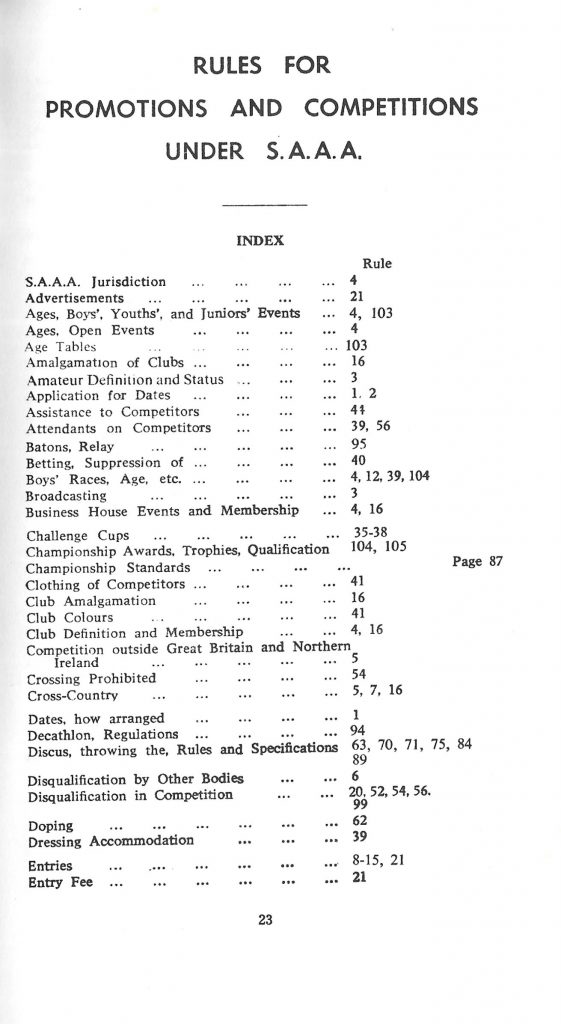
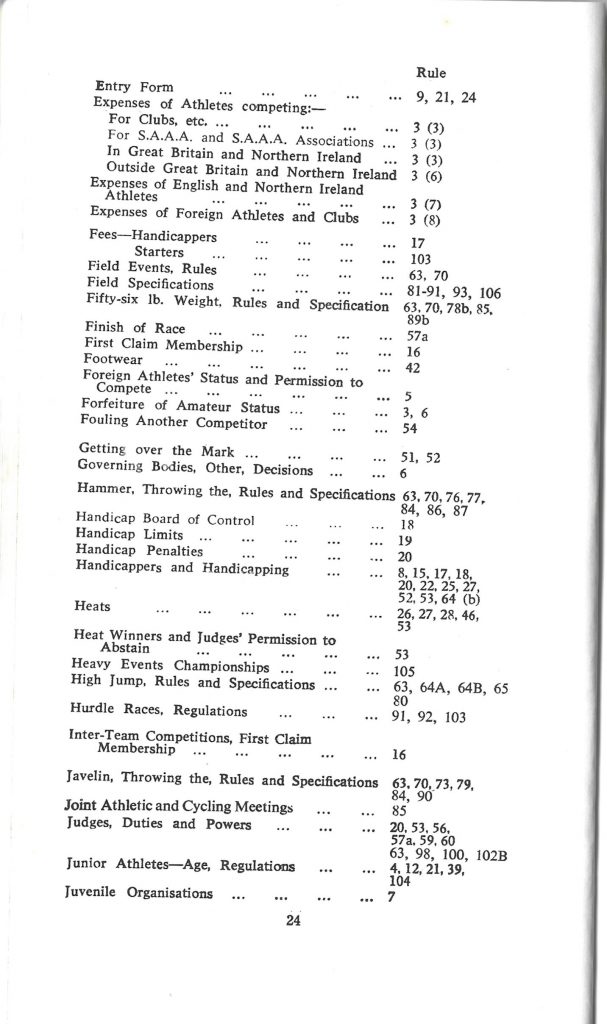
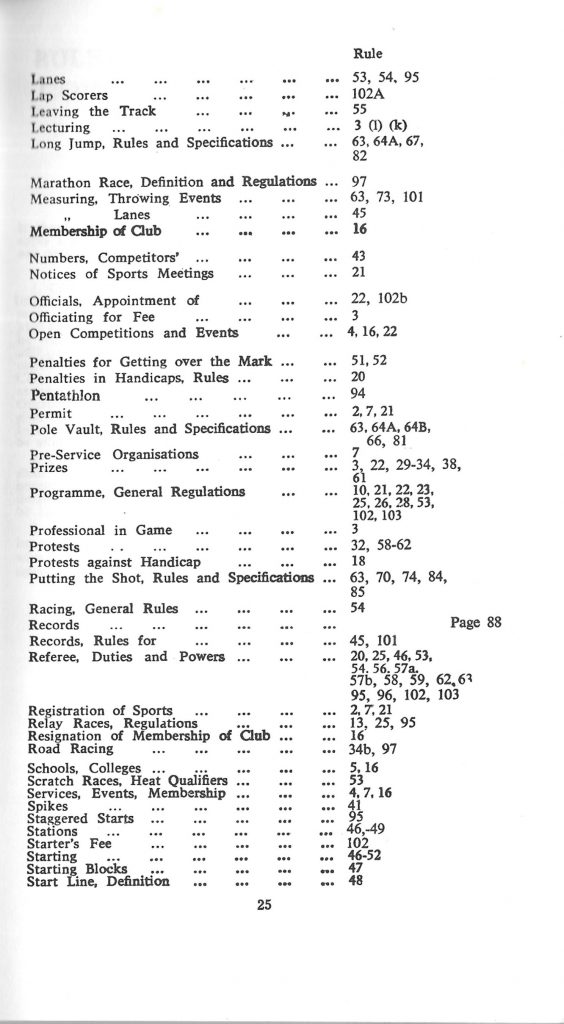
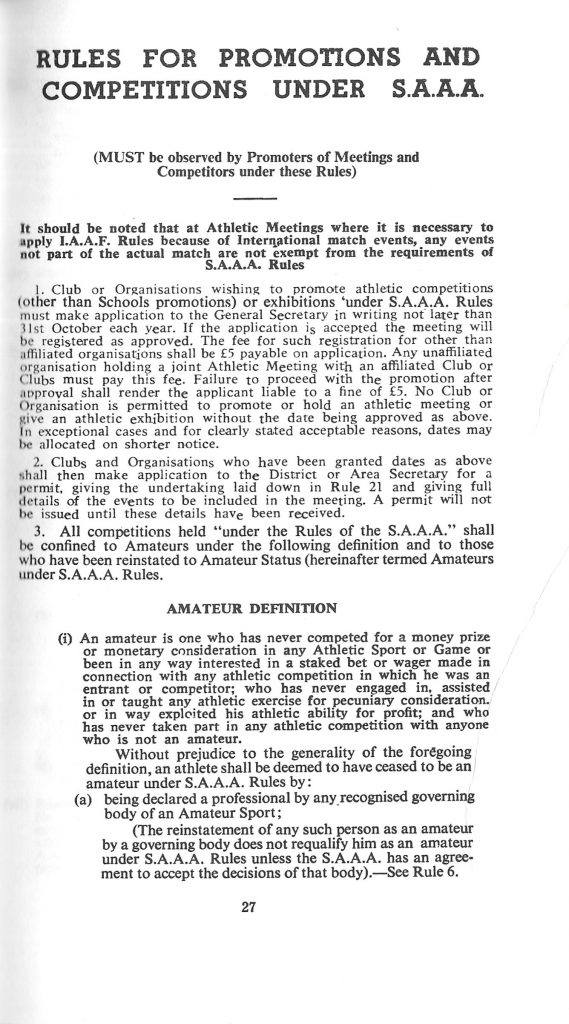
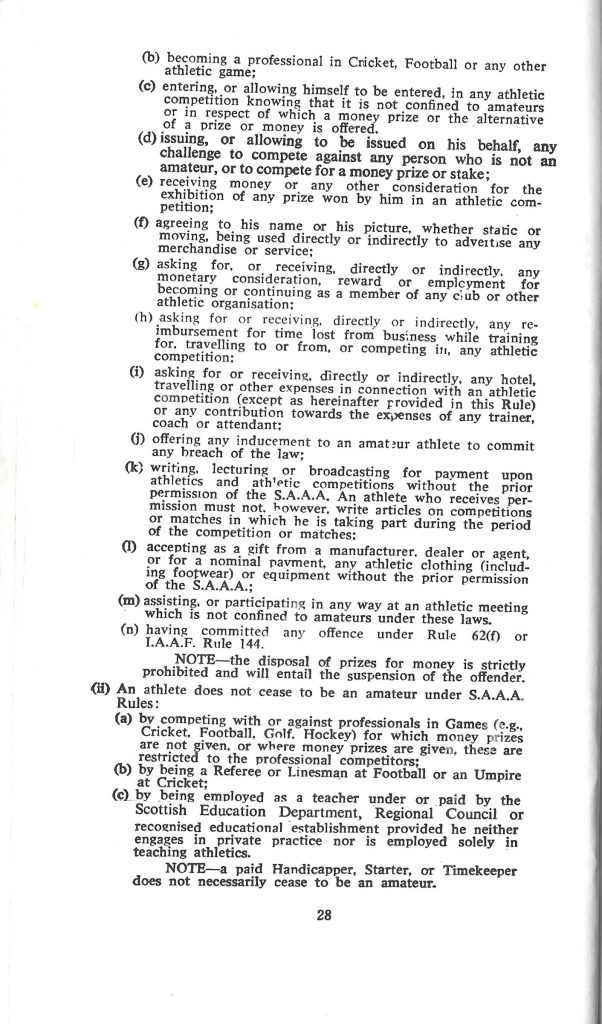
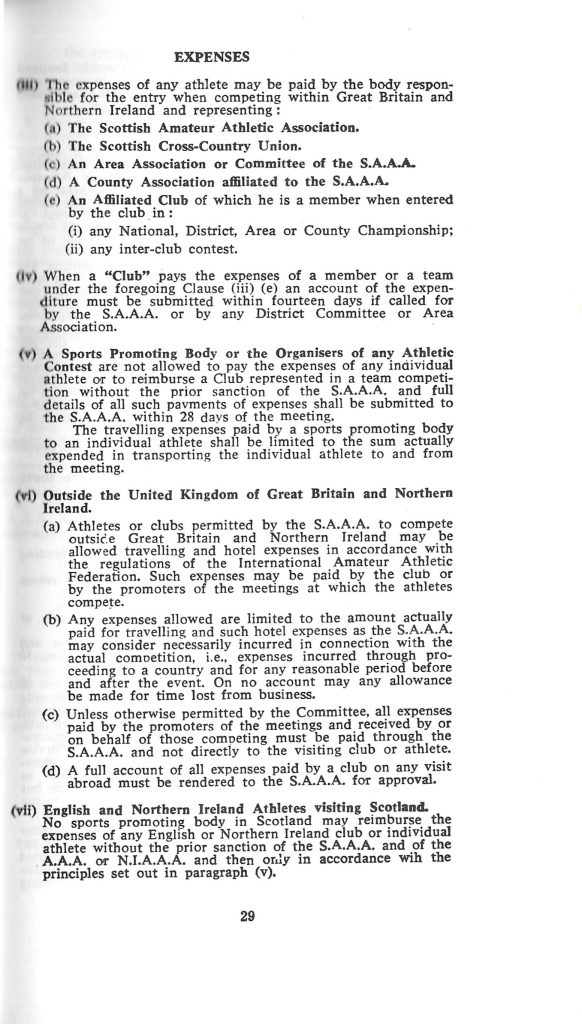
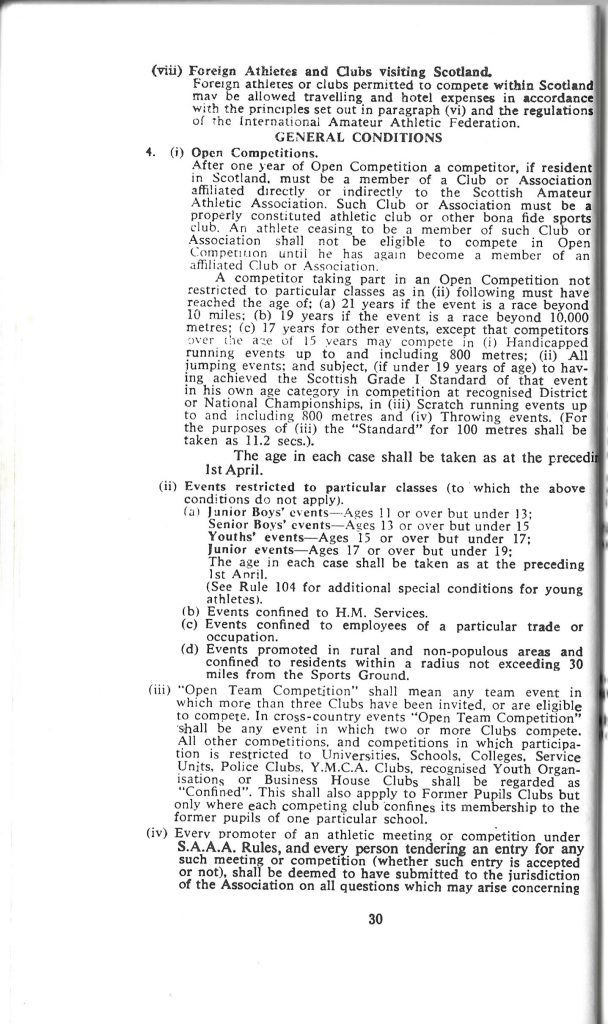
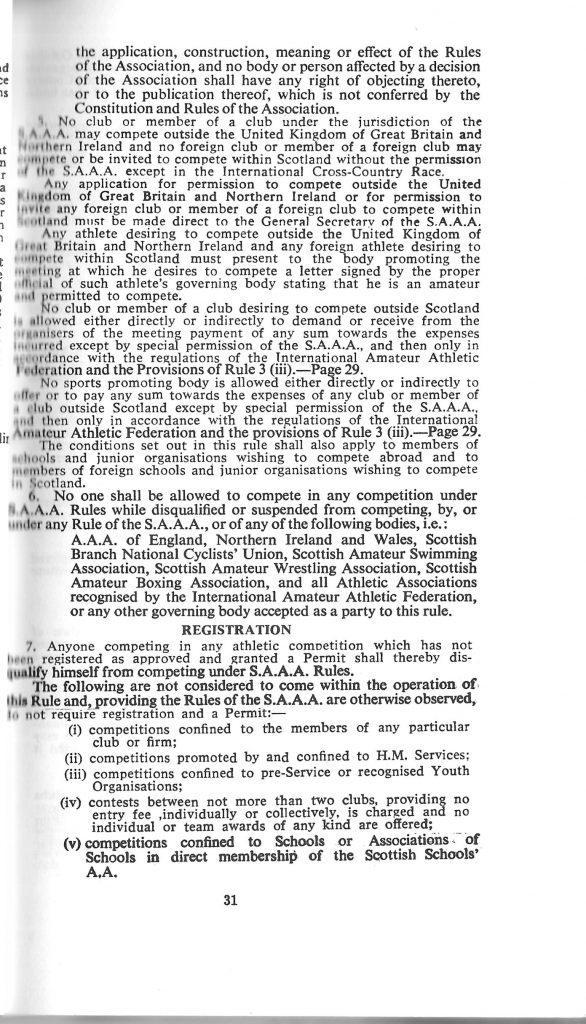
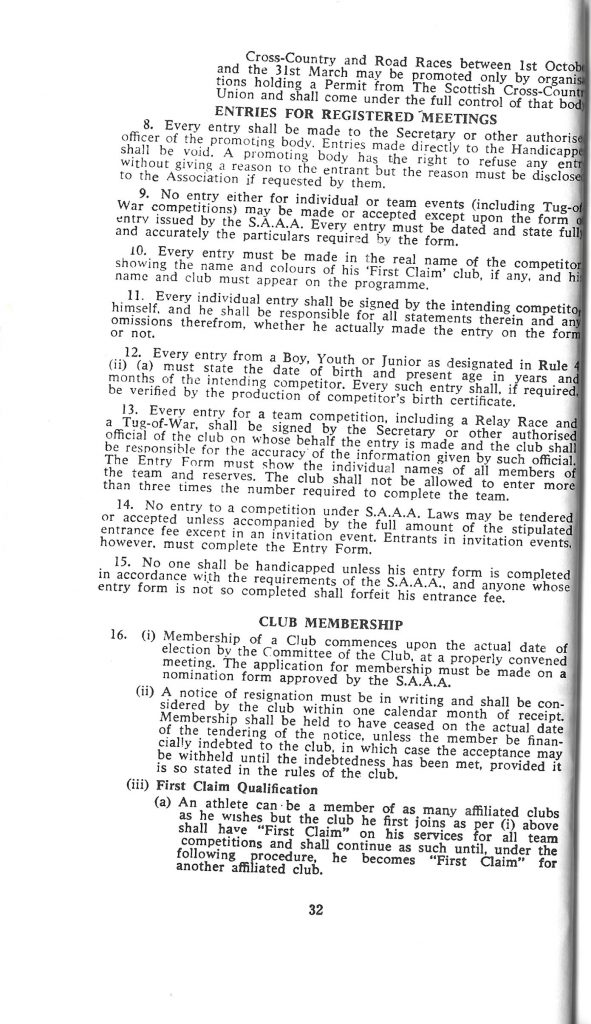
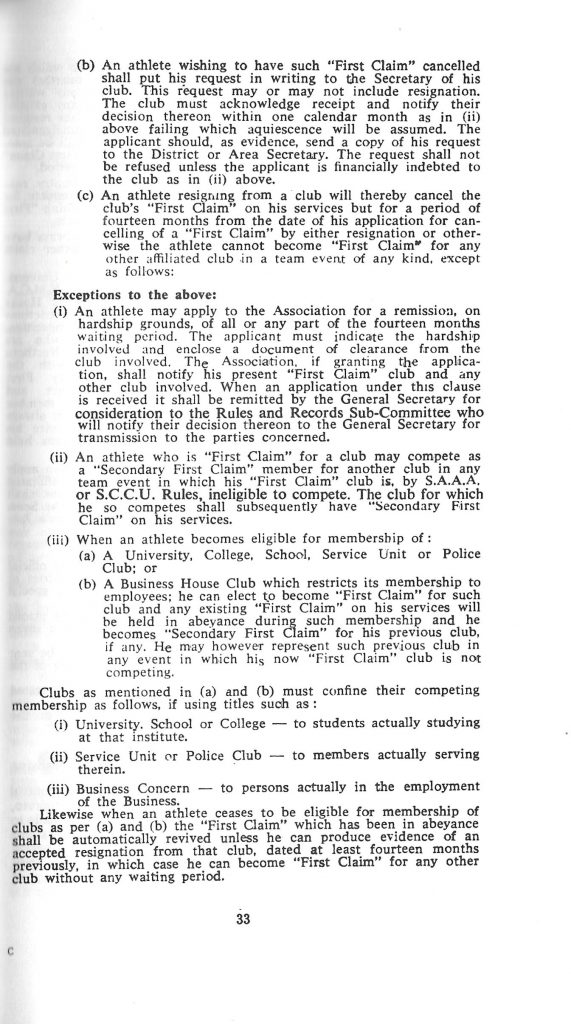
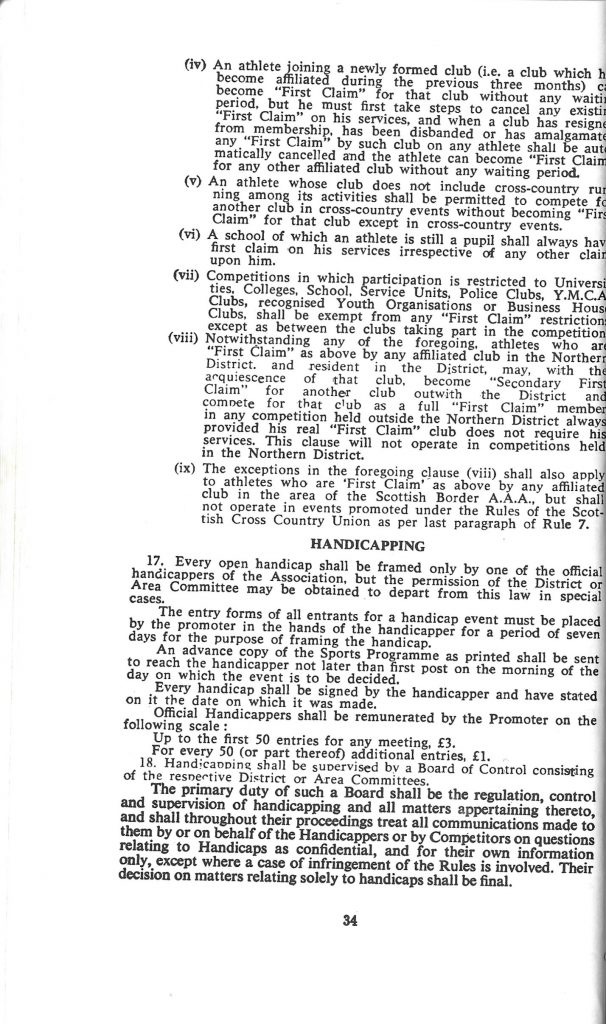
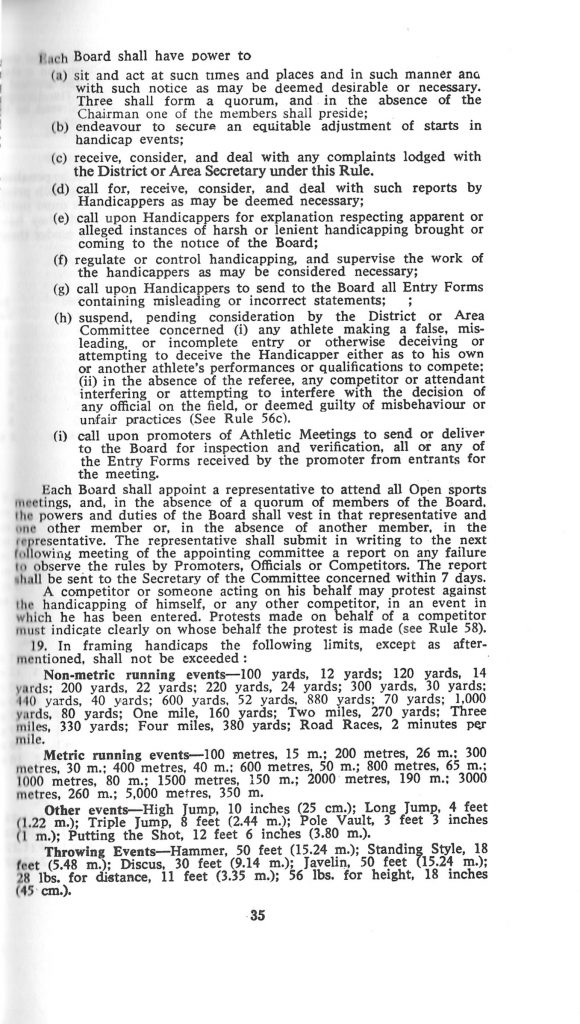
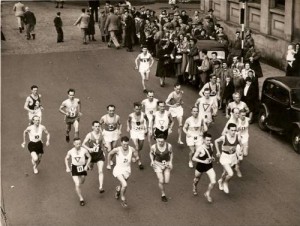
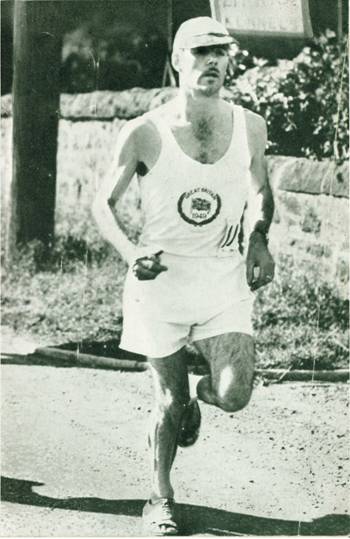
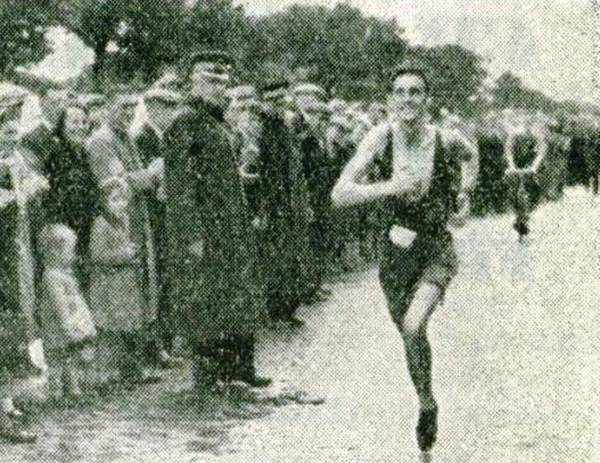

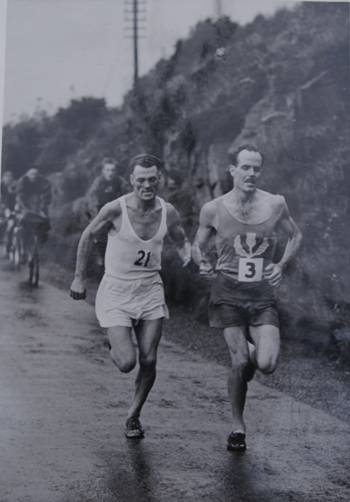
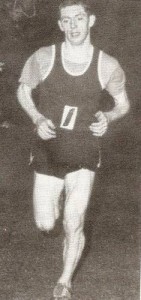
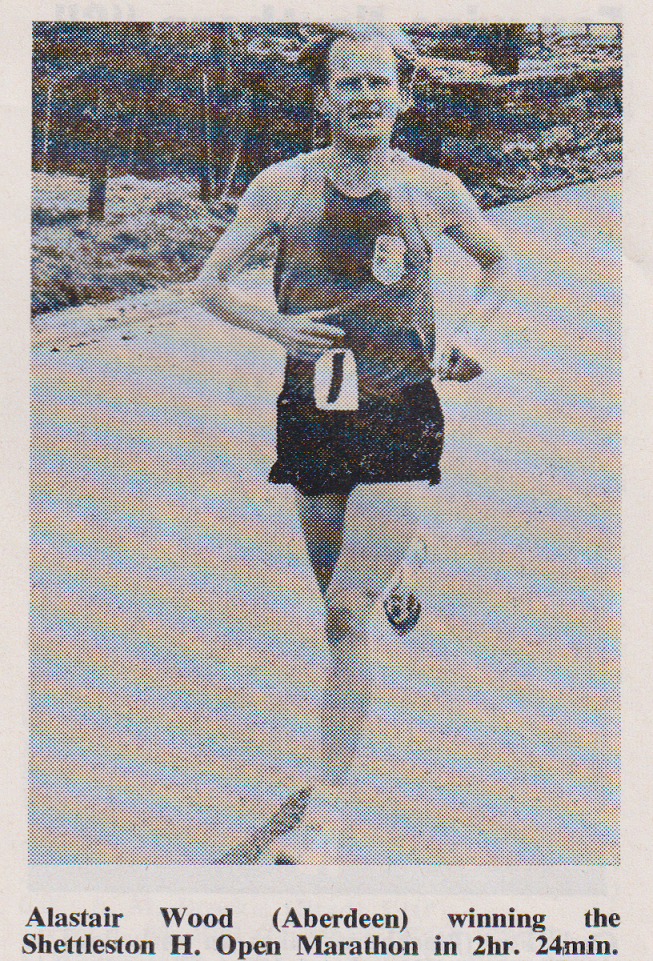
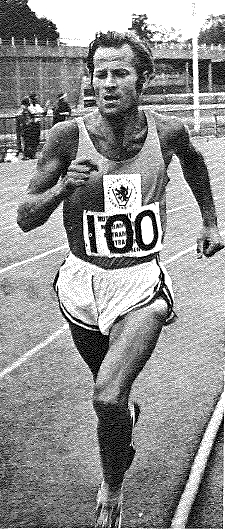
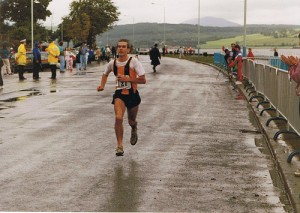
![image003[1]](http://www.scottishdistancerunninghistory.scot/wp-content/uploads/2015/09/image00311.jpg)
![Kenny%20Stuart[1]](http://www.scottishdistancerunninghistory.scot/wp-content/uploads/2015/09/Kenny-Stuart1.jpg)
![AJW[1]](http://www.scottishdistancerunninghistory.scot/wp-content/uploads/2015/09/AJW1-208x300.jpg)
